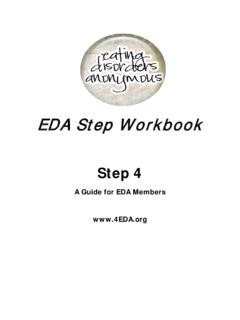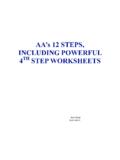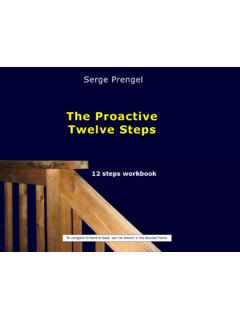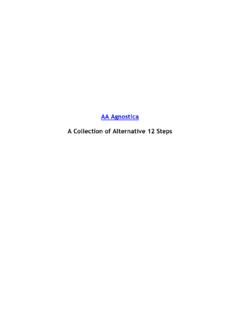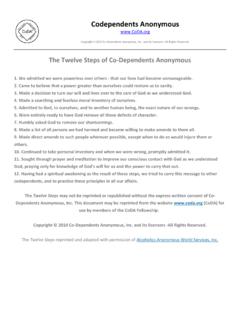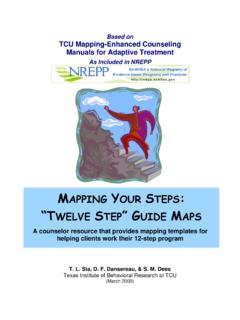Transcription of EDA Step Workbook - Eating Disordersanonymous
1 EDA step Workbook Introduction 2 INTRODUCTION This Workbook is a guide for Eating Disorders Anonymous (EDA) members. There are many "right" ways of working The Steps. We hope that this book will help you overcome bouts of perfectionism, excessive self-doubt, or hopelessness. A big part of any recovery journey is learning to be honest with yourself. As long as you face your problems you will find solutions. Are you willing to get to know yourself (imperfections and )? Are you willing to accept responsibility for your attitudes and actions instead of blaming others?
2 If so, you can recover. This book is based on different EDA members' experiences. There are as many perspectives and approaches to The Steps as there are members. We believe that is as it should be. Please take what you can use and leave the rest. Find a buddy or sponsor with whom to work the steps. It's easy to get discouraged or sidetracked when you're trying to do things on your own. Buddies and sponsors help you through hard times, when you struggle to find motivation or inspiration. They support you when you get lost in resentment, blame, or stubbornness.
3 Working the steps with somebody else in recovery is well worth the inconvenience and discomfort that come with building any new relationship. Some of us have found experience, strength and hope this way. Some of us have found lifelong friends. A Little Bit of History EDA's Steps are based on the Twelve Steps of Alcoholics Anonymous (AA). Since 1935 AA has helped millions of alcoholics. Their success inspired a number of courageous people to apply the AA principles to their recovery from many other addictions and compulsions.
4 Eating Disorders Anonymous is one of nearly four hundred distinct Twelve step groups registered with the AA Central Office. Even if some may sound obscure or even weird to the casual observer, all have helped people reclaim their lives and grow beyond addictive or compulsive behaviors. In February 2000, Gisele B. -- a young woman from Phoenix in recovery through AA -- felt frustrated trying to apply the Twelve Steps to her Eating disorder. She started a support group for people with Eating disorders, combining experiences from AA and another Phoenix group called (Self-Help for Eating Disorders), founded by Jeanne Philips nearly twenty years earlier.
5 3 This first Phoenix EDA group met at an AA meeting hall near Gisele's home. Annette H. joined the group in March 2000. The group's members focused on creating an alternative to fear-based ideas of recovery from Eating disorders. They advocated combining individual therapy with 12 - step work and meetings. Together, they began expanding EDA locally and nationally. EDA combines the 12 steps ' timeless wisdom with our growing knowledge about Eating disorder recovery. Many biological, social, and psychological reasons come together in triggering an Eating disorder.
6 The exact combination of factors varies from person to person. Each recovery is unique; however there are perceptive distortions and self-defying thought patterns many of us have in common. Sharing our struggles, supporting each other, and working The Steps help us address them. Together we find the power to grow and change. Our freedom and happiness are by-products of this work. Additional Recovery Suggestions We hope this book will support your healing. We hope you won't stop here. Especially in early recovery, it's important to get as much help as possible.
7 Different sources of information and support give us a number of perspectives on what's going on. This helps break the rigid patterns of our disease. Here are a few pointers on what you can do besides working The Steps: find a therapist you trust; u se the discussion area on the web site; j oin as many meetings as you can find, both on-line and face-to-face. If there is no meeting in your area, think about starting one. Share at meetings, even if you feel scared. We're all scared at first. Sharing helps you remind yourself that you're serious about your recovery.
8 Journal about your feelings. Have a dietitian help you figure out what a healthy, balanced diet looks like. Create an action plan. Prioritize what you need to do. Do one thing at a time; don t try to do everything at once! Slowly learn to notice and do what needs to be done without haste or hesitation. Being truthful with yourself and others helps you find solutions to life's problems. Trust your willingness and ability to find healing and to keep going when the going gets tough. Be kind, gentle, and patient with yourself when you feel overwhelmed or "imperfect.
9 " Give up on perfection. Learn to enjoy your progress. Live and appreciate one moment at a time. We wish you good health and the best of luck on your path in recovery! 4 5 EDA step Workbook step 1 A Guide for EDA Members 6 step One We admitted we were powerless over our Eating disorders that our lives had become unmanageable. "We" start this journey individually, but we're not alone. No matter how bizarre some of our behavior patterns may be, we can be sure someone else does the same thing. Eating disorders are not new and many of us had very odd behaviors indeed.
10 You are not in this by yourself. All of us feel guilt and shame at times. Talking to others who understand what we're going through gives us the trust to explore our scary secrets and help us face feelings that keep us from being true to ourselves. You can't change until you accept where you are and who you are. You find out who you are by being honest with yourself and others. "Admitting" is being honest. We're coming clean. Admitting something means accepting it as reality and taking responsibility for our part in it.

